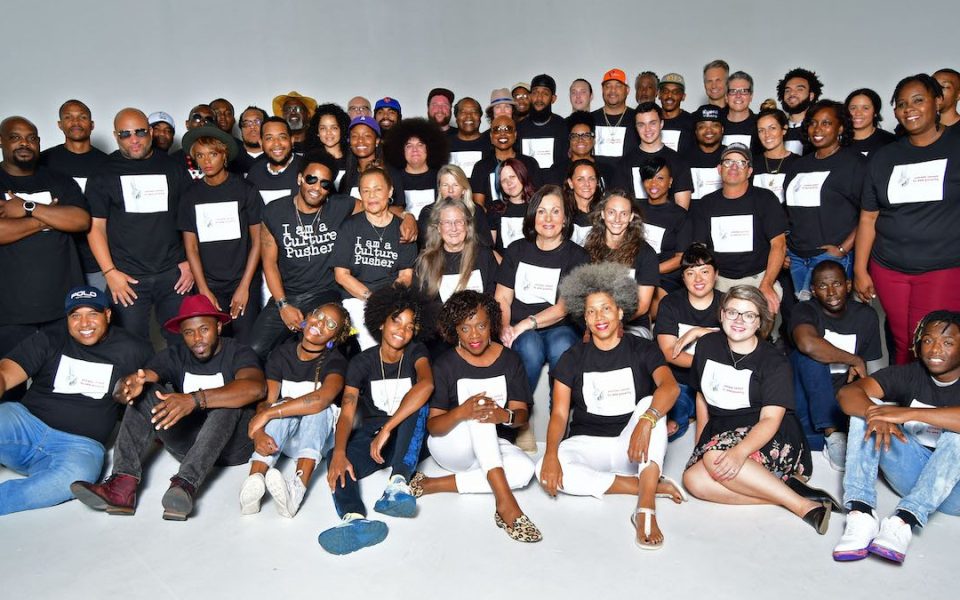Nineteen percent of Greensboro’s population — more than 57,000 citizens — live in poverty, according to the 2018 Census. A newly released album created by local artists seeks to change that.
“I’ve lived in New York and LA so I’ve seen poverty at a very mass level,” says Andreao “Fanatic” Heard, a Grammy-award winning producer of the album and a Greensboro native. “In LA, you see a lot of artists that move there to pursue their dreams and they end up on the streets. It’s so warm that they’re on your doorstep. Seeing it in those cities and seeing it here, it’s like this isn’t something that we can’t fix.”
The album, titled Artists United to End Poverty, dropped on iTunes and Amazon on Sept. 6 and features more than 50 local artists including singers Vanessa Ferguson from “The Voice”, Laurelyn Dossett, Josh King and Crystal Bright as well as poets and spiritual leaders like Josephus Thompson III and Bishop Bryan J. Pierce, Sr. of Mount Zion Baptist Church. Even Mayor Nancy Vaughan can be heard in the recordings.
The title track, “Die 4 Love,” features all of the artists on the album in a collaborative, four-and-a-half minute song not unlike the 1985 charity single, “We Are the World,” written by Michael Jackson and Lionel Richie for the album of the same title.

Heard took that same idea and decided to apply it to his hometown.
“They used music to help them through turbulent times,” Heard says about the musicians who worked on the album. “It was such an iconic moment in history…You would think that as turbulent as the times are here now, people could use music to address these things. You have to be very responsible when making music because it’s so powerful. Music is something that we can definitely use to heal.”
Mayor Vaughan believes the diversity of artists shows just how much talent the city has to offer.
“We are fortunate to have such talented local artists,” Vaughan says. “I know that there is something for everybody on this album.”
The project has been in a year in the making, a collaboration with the United Way of Greater Greensboro, a local nonprofit that works to end poverty. According to Heard, all of the proceeds from album sales will go directly to the organization. He hopes that if the album is successful, other artists will use the model to help their own cities to not only raise awareness about poverty but to eradicate it.
“Everybody thinks poverty is just about homelessness,” Heard says. “We’ve learned so much about different aspects of poverty by doing this album. Anybody can fall victim to poverty at any moment.
“Hopefully we can do this on a global scale and we can eliminate it,” he continues. “If you can eliminate it, that’s something that will outlive us.”
In addition to raising money for United Way, Heard hopes to sell enough copies of the album in the first week to get on the Billboard charts and eventually be nominated for a Grammy Award.
Heard has worked in the music industry for the last three decades, collaborating with heavy hitters including Jackson himself, Beyoncé and Notorious BIG.
But he says coming back to his hometown to create a benefit album has been one of the most rewarding experience of his career.
“I think if people get behind it, if we sell a certain number of records in the first week, then that can happen,” Heard says. “That’s the dream. To bring the Grammy home to Greensboro. That’s the ultimate goal. That’s better that working with Michael Jackson, Beyoncé, all that.”
In addition to the title song, the album boasts 47 other tracks, many of them recognizable singles and popular songs by local musicians. Halfway through the album, Debbie the Artist’s expressive “Soul Cry” leads into Josh King’s folksy, acoustic song, “Dreamer.” Interspersed between songs are interludes by local activists such as a Spanish poem by Joan Francisco Valdés Santos or a monologue by Ed Whitfield set to pan flute instrumentals or a steady, produced beat. Heard says having a variety of artists and activists on the album was crucial to spreading the message.
“We got politicians involved, community activists, spiritual leaders,” says Heard. “You have to have all those things to tackle this thing. By the time we finished this, everyone in the city was involved with it. It’s everybody’s album, not just our album.”
The album is available to purchase on iTunes and Amazon. Find out more on United Way’s website here.
Join the First Amendment Society, a membership that goes directly to funding TCB‘s newsroom.
We believe that reporting can save the world.
The TCB First Amendment Society recognizes the vital role of a free, unfettered press with a bundling of local experiences designed to build community, and unique engagements with our newsroom that will help you understand, and shape, local journalism’s critical role in uplifting the people in our cities.
All revenue goes directly into the newsroom as reporters’ salaries and freelance commissions.


Leave a Reply